
Nikolai Vissarionovich Nekrasov was a Russian liberal politician and the last Governor-General of Finland.
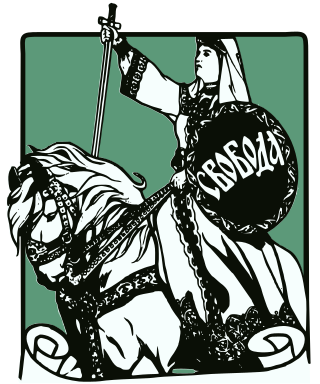
The Constitutional Democratic Party, also called Constitutional Democrats and formally the Party of People's Freedom, was a political party in the Russian Empire that promoted Western constitutional monarchy—among other policies—and attracted a base ranging from moderate conservatives to mild socialists. Party members were called Kadets from the abbreviation K-D of the party name. Konstantin Kavelin's and Boris Chicherin's writings formed the theoretical basis of the party's platform. Historian Pavel Miliukov was the party's leader throughout its existence.
The Union of 17 October, commonly known as the Octobrist Party, was a liberal-reformist constitutional monarchist political party in late Imperial Russia. It represented moderately right-wing, anti-revolutionary, and constitutionalist views.

The Central Rada of Ukraine, also called the Central Council, was the All-Ukrainian council that united deputies of soldiers, workers, and peasants deputies as well as few members of political, public, cultural and professional organizations of the Ukrainian People's Republic. After the All-Ukrainian National Congress, the Council became the revolutionary parliament in the interbellum lasting until the Ukrainian-Soviet War. Unlike many other councils in the Russian Republic, bolshevization of this council failed completely, prompting the Bolsheviks in Ukraine to relocate to Kharkov.
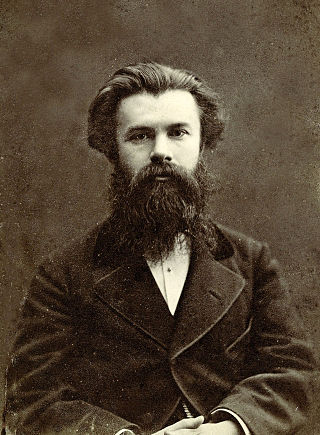
Mykhailo Petrovych Drahomanov was a Ukrainian intellectual and public figure. As an academic, Drahomanov was an economist, historian, philosopher, and ethnographer, while as a public intellectual he was a political theorist with socialist leanings, perhaps best known as one of the first proponents of Ukrainian autonomism. For Drahomanov, ethnographic studies had a deep influence on his political ideas, and his politics in turn motivated study of particular areas of Ukrainian folk literature.
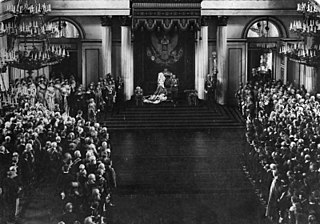
Legislative elections were held in the Russian Empire from 26 March to 20 April 1906. At stake were the 497 seats in the State Duma of the Russian Empire, the legislative assembly. Election for the First State Duma, which only ran from 27 April to 8 July (O.S.) 1906, returned a significant bloc of moderate socialists and two liberal parties which demanded further reforms. For this reason, it is sometimes called the Duma of Public Anger.
Ukrainian Socialist-Revolutionary Party was a political party in Ukraine and the Russian Republic founded in April 1917, based on separate groups and circles of SRs that existed on the territory of Ukraine since 1905. The left faction of the party dissolved it in 1918 forming a new party, while the Ukrainian Socialist-Revolutionary Party was recreated in January 1919 by its moderate faction members.

Vsevolod Oleksandrovych Holubovych was the prime minister of the Ukrainian People's Republic from January to March 1918.
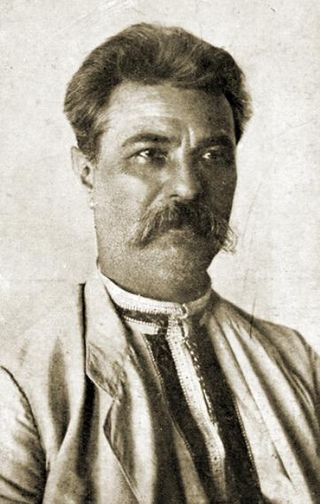
Serhiy Yefremov was a Ukrainian literary journalist, historian, critic, political activist, statesman, and academician. He was a member of the Ukrainian Academy of Science (1919) and Shevchenko Scientific Society in Lviv. Yefremov is his literary pseudonym; his real name is Okhrimenko.
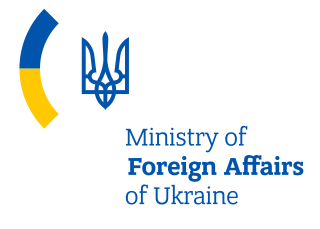
The Ministry of Foreign Affairs of Ukraine is the ministry of the Ukrainian government that oversees the foreign relations of Ukraine. The head of the ministry is the Minister of Foreign Affairs.
The Georgian Socialist-Federalist Revolutionary Party was a Georgian nationalist party, founded in April 1904. The party's program demanded the national autonomy of Georgia, within the framework of a Russian federal state, and advocated for a democratic socialist system. Mainly based in the rural areas, the party's membership was almost entirely drawn from the peasantry and the petty gentry. The political profile of the party had an appeal amongst moderately nationalist intellectuals, schoolteachers and students. The party strived that agricultural issues not be decided by central authorities, but by autonomous national institutions. The party published the periodical Sakartvelo.
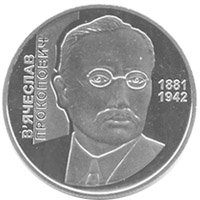
Vyacheslav (Viacheslav) Kostiantynovych Prokopovych was a Ukrainian politician and historian.

Ivan Matviiovych Steshenko was a Ukrainian politician, writer, translator, and academic of the Shevchenko Scientific Society. He had several pen-surnames: Serdeshny, Sichovyk, Svitlenko, and Stepura.

Brotherhood of Tarasovs was an underground student organization. It was established in 1891 during a visit to the Taras Shevchenko burial grounds near Kaniv.

Borys Dmytrovych Hrinchenko was a classical Ukrainian prose writer, political activist, historian, publicist, and ethnographer. He was instrumental in the Ukrainian cultural revival of the late 19th and beginning of the 20th centuries.
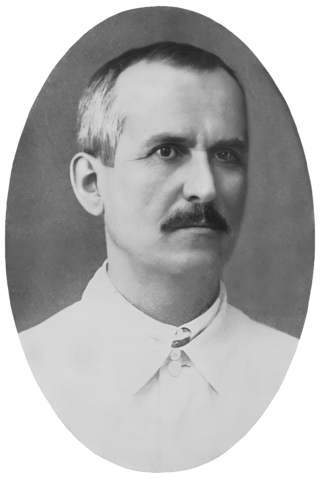
Volodymyr Musiiovych Chekhivskyi was a Ukrainian activist and politician who served as Chairman of the Council of People's Ministers of the Ukrainian People's Republic from December 1918 to February 1919. Previously, he was a member of the Russian State Duma and Russian Constituent Assembly. Chekhivskyi was also among the founders of the Ukrainian Autocephalous Orthodox Church, and the brother of conductor and singer Oleksa Chupryna-Chekhivskyi.
The Ukrainian National Revival took place during a period when the territory of modern Ukraine was divided between the Austrian Empire, the Kingdom of Hungary and the Russian Empire after the partitions of Poland at the end of the 18th century. The period took place soon after the Haidamaka Uprisings rocked lands of former Cossack Hetmanate.
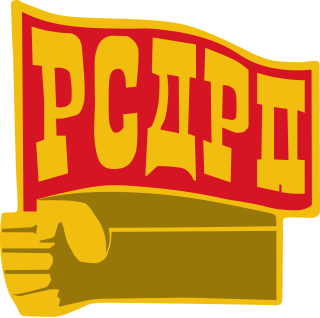
The Russian Social Democratic Labour Party, also known as the Russian Social Democratic Workers' Party or the Russian Social Democratic Party, was a socialist political party founded in 1898 in Minsk.

The General Jewish Labour Bund in Lithuania, Poland and Russia, generally called The Bund or the Jewish Labour Bund, was a secular Jewish socialist party initially formed in the Russian Empire and active between 1897 and 1920. In 1917 the Bund organizations in Poland seceded from the Russian Bund and created a new Polish General Jewish Labour Bund which continued to operate in Poland in the years between the two world wars. The majority faction of the Russian Bund was dissolved in 1921 and incorporated into the Communist Party. Other remnants of the Bund endured in various countries. A member of the Bund was called a Bundist.
A hromada was one of a network of secret societies of Ukrainian intelligentsia that appeared soon after the Crimean War. The societies laid a groundwork for appearance of the Ukrainian political elite and national political movement. The Ukrainian national and anti-oppressive movement intensified with the January Uprising and issuing of the Valuev Circular. Many were former members of the disbanded Brotherhood of Saints Cyril and Methodius.














